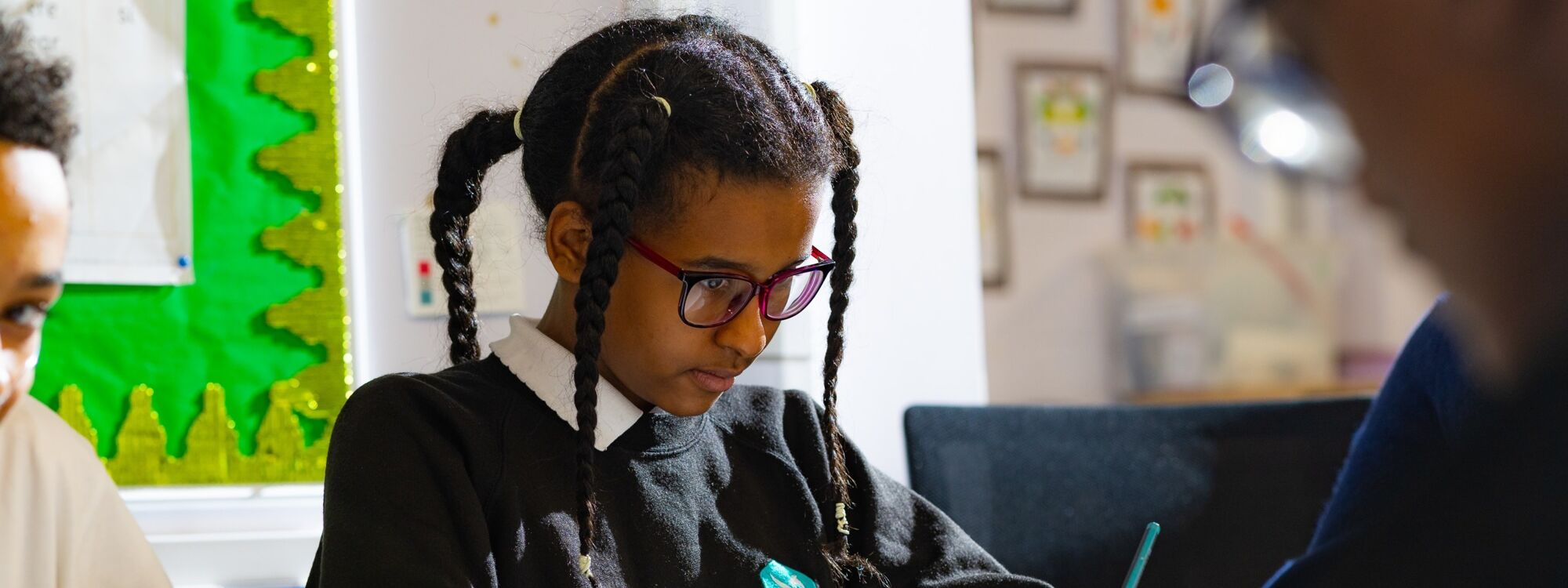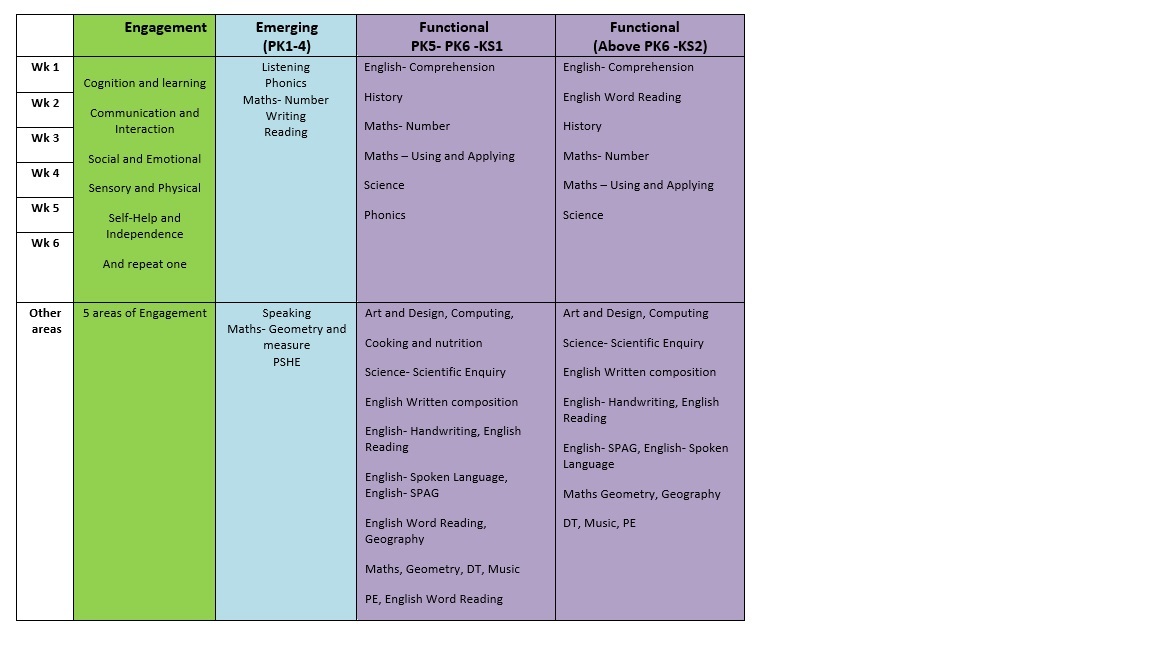
- Home
- Teaching and Learning
- Assessment at Vale School
Assessment at Vale School
Assessment and Achievement
Intent- Why we assess our children
At Vale School we recognise that effective assessment is essential to support the quality of teaching, learning, achievement, and progress of our pupils. All pupils at Vale School have an Education Health Care Plan (EHCP). We appreciate that all our learners are unique and are at different starting points and pathways within their academic journey. They all need different learning targets to develop their skills at different points, which is why no one single assessment tool meets the needs of all our pupils.
The assessments at Vale School will therefore vary depending on which Curriculum Journey each individual child is on and so the way our children are assessed is decided on an individual basis and should support the learner in noting meaningful achievement within school and the wider school community. We believe that the assessment of a pupil's achievements and progress should be a story- how much an individual pupil has achieved in any given time, e.g. a term, a year, Key Stage, and overall time at our school.
Implementation- How we assess our children
In addition to the assessment tools that are used for our children who access some or all their learning through inclusion in our partner mainstream schools, we have created our own Assessment statements, in collaboration with other Haringey Special schools. This ensures that we can assess our children accurately in all aspects of the curriculum for those children working within the Engagement profile, who are not ready for subject specific learning, and for those who are ready and working within Pre-Key Stage Standards. We use an assessment program called Solar to upload evidence of learning milestones.
Key Forms of assessment:
Assessment for pupils accessing mainstream classes at EYFS (Early Years Foundation Stage) and Primary
- Target Tracker
- Tapestry for those in EYFS
- EYFS baseline assessment
- EYFS Profile
- National Curriculum phonics check at Year 1 and 2
- KS1 SATS
- Termly PSP meetings
- Child Centred Annual reviews
- Progress is tracked and updated regularly
- These children are assessed following our partner mainstream school’s timetable where judgments on progress are made between the class teacher and our Assistant Head.
Assessment for pupils accessing mainstream classes at Secondary
As with Primary, secondary children are assessed following our partner mainstream school’s timetable where judgments on progress are made between the class teacher, the inclusion coordinator and the Deputy Head Teacher. The Deputy Head Teacher and Inclusion Manager hold termly PSP meetings, Annual Reviews and regularly informally monitor progress.
Assessment for Vale Primary and Secondary children who are following the Engagement Profile or Pre-Key Stage Standards
- Vale Assessment statements on Solar
- Assessed work sample evidence on Solar
- Termly PSP meetings
- Child centred Annual reviews
- Feedback from staff members made during the plenary or team meetings
- Progress is tracked and updated regularly and moderated every half term
- Phonics tracking
Assessment for EYFS
- Assessed work sample evidence on Solar
- EYFS baseline assessment
- EYFS Profile
- Vale Assessment statements on Solar
- Spontaneous/narrative/event observations including feedback from staff members made during the plenary or team meetings
- Termly PSP meetings
- Child centred Annual reviews
- Progress is tracked and updated regularly and moderated every half term
- Phonics tracking
Children working above Pre-Key Stage 6 but below age expected levels
- We have a few children who are working above the Pre-Key Stage Standards who are not included in our partner secondary school. These children follow the same assessment process as above but are assessed using KS2 (Key Stage 2) statements on Solar or a mix between our Vale Assessment statements and KS2 statements, depending on their levels of attainment.
- Functional Skills Assessment
Outreach Children
Pupils in our outreach programme are assessed in the same way as their relevant group.
In addition to these our children are also assessed using:
- Baseline assessment on admission to the school
- Daily informal teacher assessment
- Pupil profiles, where appropriate e.g. manual handling, eating & drinking, toileting, communication, and behaviour
- Teacher shared moderation
- Videos- showing evidence of learning and achievement
- A short annotation from the adult working with the pupil on how the pupil achieved the target
- Photos- showing a skill, knowledge or understanding being used (which was achieved in the session) or work completed by the learner
- Observations from visiting professionals e.g. Physiotherapist
- Leadership Team - they can add evidence that may be captured during learning walks
- EHCP outcomes are set each year. In some cases, particularly when pupils join our school, the outcomes on the EHCP are not specific enough (SMART) to meet the priority needs of a pupil. Where this is the case teachers will reform the targets set and work to these. These targets can then be updated at the next annual review
Assessed work:
- These are uploaded onto Solar and set out with a clear date, learning statement/objective linked to the relevant assessment pathway and at what level this has been achieved, (which are also linked to the children’s PSP targets/EHCP outcomes), comments on what the child was doing/did referring to I Can and I Know statements, level of support given and next steps.
- For assessed pieces of work there is at least 1 piece per week on Solar.
- There is a set plan for assessed pieces of work each half term to ensure a balanced coverage e.g.

Tracking Progress
- PSP targets are reviewed and updated every term in meeting with parents/carers. These targets are linked directly to the outcomes on a child’s EHCP. A record is kept of each child’s progress towards their PSP targets every term.
- At the end of each term assessment grids are completed to show updated ‘levels’ in all assessed areas. These are moderated in meetings with class teachers and the Leadership Team. There is a narrative section to record any key events e.g. introduction of a communication device, an extended hospital stays.
- In June/July each year attainment for the year is collated. Data from classes, Key Stages and the whole school is then analysed. Ways forward in specific areas are identified.
- In June each year, a school report is written for each pupil which documents progress in key areas on our Vale assessment tool. This also contains progress made towards each child’s EHCP outcomes and next steps to be taken.
Impact- How we know what the children have learnt and how well they have learnt it
Through our rigorous assessment of our children, we can track the progress all our children make whether they are working within our partnership mainstream school, working above or within the Pre-Key Stage standards or working within the Engagement profile. This includes personal development targets, spiral learning and how well the children have secured the knowledge and skills they have learnt. This enables us to closely match future lessons to individual children's needs. Our teachers use data to drive their in-the-moment responses to pupil learning, strategically gathering pupils’ knowledge, and checking for understanding to allow for additional input and support to be given.
Long Term Impact
Ultimately, our aims are long term, and the impact we wish to see goes beyond our assessment outcomes, it is shown in who are pupils are when they leave us and what they are ready to achieve in their lives.
Additional Information
Celebrating Achievement
Any achievements made by the child/children are celebrated at the time, daily and often. This helps the learner to understand what and how he or she is learning and build on successes. Teaching staff use a range of instant feedback techniques to celebrate progress seen. Where a child’s learning is on paper, marking and feedback is used to raise achievement, set targets and help pupils to improve. Marking and feedback should inform pupils about what specifically they have done well and the next steps to take. For other children verbal praise or their form of communication is used e.g. Verbal, PODD book, communication device etc.
Achievement is also celebrated in our assemblies through our ‘Star of the Week’ class certificates and stickers
Reporting to Parents
- Termly meetings are held with parents to look at and discuss progress made towards targets on a child’s PSP which is directly linked to their EHCP outcomes.
- Annual review of a child’s Education, Health and Care Plan
- Reports on progress from therapists working with the children at school
- Day to day contact through emails or phone calls where appropriate
- End of Year reports
Parents/Carers are also welcome to contact the class teacher at any time to discuss their child’s progress.
Comparing the school’s performance:
This is difficult for special schools as due to the nature of our learners’ targets are personalised to each child and national statistics are currently framed in the context of comparisons with all primary schools.
However you may wish to look at the following - https://www.compare-school-performance.service.gov.uk/school/102176/vale-school/primary
Vale School performance tables:
OFSTED: https://reports.ofsted.gov.uk/provider/25/102176